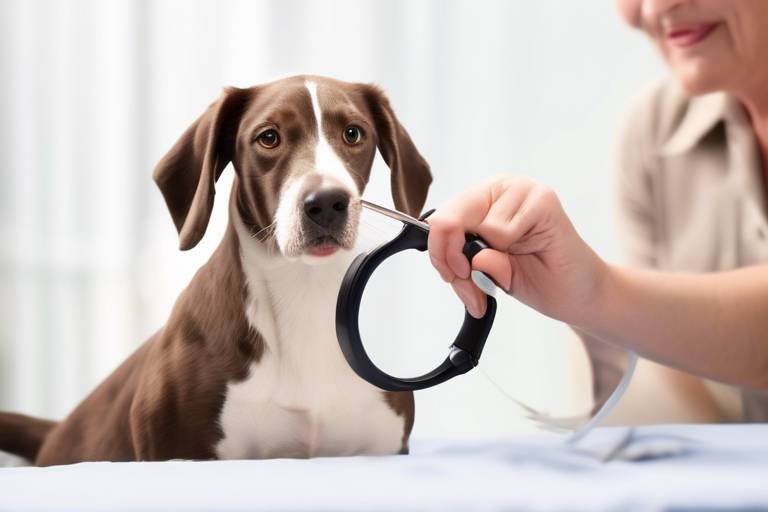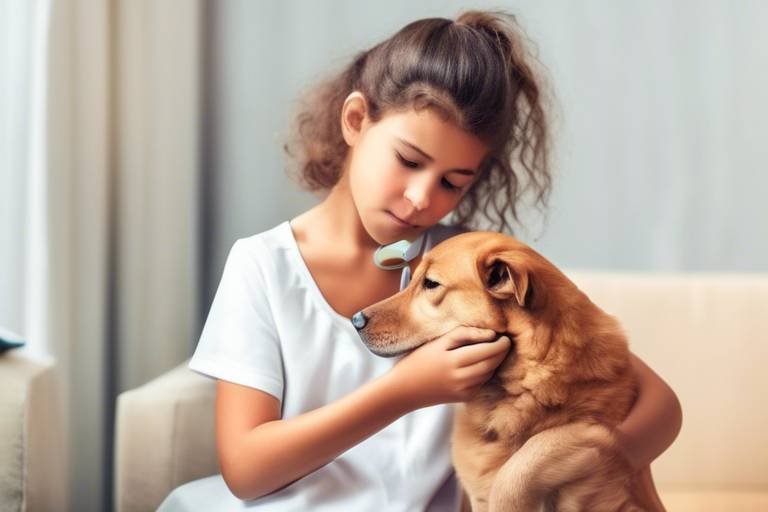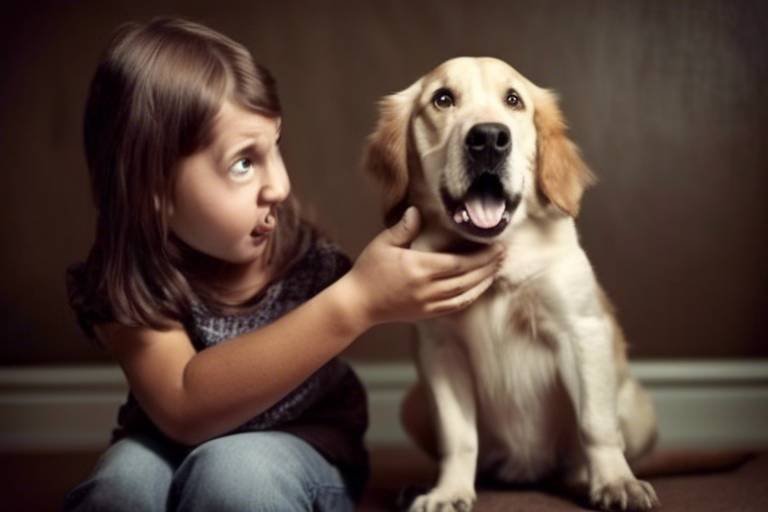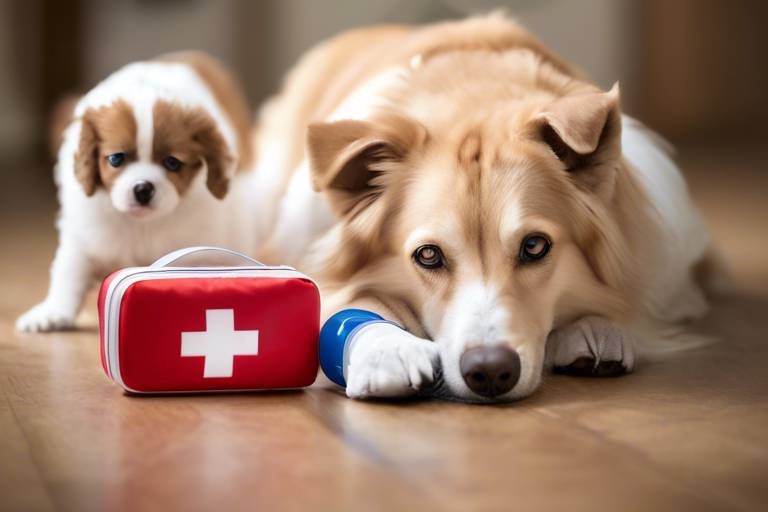The Role of Regular Health Checks in Pet Safety
When it comes to our furry friends, their health and happiness are often at the forefront of our minds. Just like humans, pets require regular health checks to ensure they are living their best lives. These visits to the veterinarian are not just routine; they are a critical component of responsible pet ownership. By prioritizing regular health checks, we can catch potential health issues before they escalate into serious problems, ensuring our pets remain vibrant and full of life.
Imagine your pet as a beloved family member. Would you ignore signs of illness in a family member? Of course not! Regular health checks serve as a safety net, allowing for early detection of conditions that might otherwise go unnoticed. This proactive approach not only enhances the quality of life for our pets but also brings peace of mind to us as owners. It’s a win-win situation!
Furthermore, routine health checks provide an excellent opportunity for pet owners to engage with their veterinarians, asking questions and gaining insights into their pet's health and well-being. These visits can cover a wide range of topics, from vaccinations and dental care to nutritional advice and behavioral concerns. It’s all about creating a strong partnership between pet owners and veterinary professionals.
In essence, regular health checks are not just about preventing illness; they are about fostering a holistic approach to pet care that encompasses physical, mental, and emotional well-being. So, if you haven't already, consider scheduling that next vet appointment. Your pet will thank you for it!
Regular health checks involve comprehensive examinations that assess a pet's overall health, helping to identify potential issues before they become serious. This proactive approach is essential for maintaining a pet's quality of life. During these visits, veterinarians typically conduct a series of evaluations, including:
- Physical examinations to check for any visible signs of illness
- Vaccination updates to keep your pet protected against common diseases
- Dental assessments to ensure oral health
- Nutritional evaluations to discuss diet and weight management
By addressing these areas, pet owners can ensure that their companions are not only healthy but also thriving.
Routine veterinary visits provide numerous benefits, including vaccinations, dental care, and nutritional advice. These services help prevent diseases and ensure pets receive timely treatments, contributing to their long-term health and happiness. Additionally, regular vet visits can:
- Help identify behavioral issues early on
- Provide guidance on exercise and playtime
- Offer preventive care tailored to your pet's specific needs
By investing time in these visits, you are essentially investing in your pet's future.
One of the most significant advantages of regular health checks is the early detection of diseases. Conditions such as diabetes, cancer, and heart disease can be life-threatening if not caught in time. Regular check-ups allow for prompt treatment, which can significantly improve outcomes for your furry friend. Picture this: catching a health issue early is like spotting a small crack in a dam before it bursts. It allows for timely intervention and can prevent a much larger problem down the line.
Understanding common health issues that pets face can help owners recognize symptoms early. Here are a few prevalent conditions:
- Obesity: A growing concern that can lead to numerous health problems.
- Allergies: Pets can suffer from various allergies that may require management.
- Dental Disease: Often overlooked, dental health is crucial for overall well-being.
By being aware of these issues, pet owners can take proactive steps to ensure their pets receive the care they need.
Vaccinations are a crucial aspect of pet health checks, protecting pets from serious diseases. Regular vaccination schedules can prevent outbreaks and ensure that pets remain healthy and safe throughout their lives. Think of vaccinations as a shield, guarding your pet against harmful illnesses. It's essential to stay up-to-date with these vaccinations to provide your pet with the best possible protection.
Veterinarians can provide valuable nutritional guidance during health checks, helping pet owners choose the right diet for their pets. Proper nutrition is vital for maintaining health, managing weight, and preventing chronic diseases. Just as humans thrive on balanced diets, so do our pets! A well-nourished pet is a happy pet, and a happy pet is a joy to have around.
Establishing a regular health check schedule is essential for pet owners. The frequency of visits can vary based on several factors, including age, breed, and health status. For instance, puppies and kittens may need more frequent visits than older pets, who may require specialized care and monitoring for age-related conditions. Consistency in monitoring their health is key to catching any issues early.
Different life stages require different health check frequencies. Here’s a brief overview:
| Life Stage | Recommended Frequency |
|---|---|
| Puppies/Kittens | Every 3-4 weeks until 16 weeks old |
| Adult Pets | Annually |
| Senior Pets | Every 6 months |
By adhering to these guidelines, pet owners can ensure their companions receive the necessary care at every stage of life.
Recognizing signs that indicate a pet may need a vet visit is crucial. Changes in behavior, appetite, or physical condition can signal underlying health issues that require immediate attention. Some signs to watch for include:
- Loss of appetite
- Excessive thirst
- Unusual lethargy
- Vomiting or diarrhea
If you notice any of these symptoms, don’t hesitate to reach out to your veterinarian. It’s always better to be safe than sorry!
In conclusion, regular health checks are vital for ensuring the safety and well-being of pets. By prioritizing these visits, pet owners can enhance their companions' quality of life and prevent serious health issues. Remember, a healthy pet is a happy pet, and investing in their health today can lead to countless joyful moments together in the future.
Q: How often should I take my pet for a health check?
A: Generally, adult pets should visit the vet at least once a year, while senior pets may need to go every six months. Puppies and kittens require more frequent visits during their early stages of development.
Q: What should I expect during a health check?
A: During a health check, your veterinarian will perform a physical examination, discuss your pet's diet and behavior, check vaccination status, and may conduct laboratory tests if necessary.
Q: Are vaccinations really that important?
A: Yes! Vaccinations are crucial for preventing serious diseases and ensuring your pet's overall health. Keeping up with vaccination schedules helps protect not only your pet but also other animals and humans.
Q: What are some signs I should look for that indicate my pet needs to see a vet?
A: Look for changes in appetite, behavior, weight, or any physical symptoms like vomiting, diarrhea, or lethargy. If something seems off, it's best to consult your veterinarian.

Understanding Pet Health Checks
This article explores the importance of regular health checks for pets, emphasizing their role in early detection of health issues and ensuring the overall well-being of our furry companions.
When it comes to our beloved pets, understanding health checks is crucial. Regular health checks involve comprehensive examinations that assess a pet's overall health. Think of it as a routine check-up for your furry friend, similar to what we humans experience at the doctor's office. These checks are designed to identify potential issues before they escalate into serious problems. Just like a car needs regular maintenance to run smoothly, our pets require consistent health evaluations to thrive.
During a health check, veterinarians will typically evaluate various aspects of your pet's health, including:
- Physical Examination: This includes checking the pet's weight, coat condition, and overall appearance.
- Vital Signs: The vet will monitor heart rate, respiratory rate, and temperature.
- Dental Health: A thorough check of the teeth and gums can reveal a lot about your pet’s overall health.
- Vaccination Status: Ensuring your pet is up-to-date on vaccinations is vital for preventing diseases.
This proactive approach is essential for maintaining a pet's quality of life. Just as we might catch a cold early and treat it before it turns into something more serious, regular health checks can help in the early detection of health issues. For instance, a vet may notice a slight weight gain in your pet during a routine visit. This could be an early indicator of obesity, which can lead to more severe health problems down the line if not addressed promptly.
Moreover, health checks aren't just about identifying problems; they also provide an opportunity for pet owners to ask questions and gain insights into their pet's health. Veterinarians can offer personalized advice on various topics, from diet and exercise to behavioral concerns. This interaction fosters a deeper understanding of your pet's needs and enhances the bond you share.
In summary, regular health checks are not merely a formality; they are an essential component of responsible pet ownership. By prioritizing these visits, you not only ensure your pet's health but also enhance their happiness and longevity. A healthy pet is a happy pet, and nothing beats the joy of seeing your furry friend thrive!
Routine veterinary visits provide numerous benefits, including vaccinations, dental care, and nutritional advice. These services help prevent diseases and ensure pets receive timely treatments, contributing to their long-term health and happiness.
Regular health checks enable early detection of diseases, allowing for prompt treatment. This can significantly improve outcomes for conditions such as diabetes, cancer, and heart disease, ensuring pets live longer, healthier lives.
Understanding common health issues that pets face can help owners recognize symptoms early. Conditions such as obesity, allergies, and dental disease are prevalent and can be managed effectively with regular check-ups.
Vaccinations are a crucial aspect of pet health checks, protecting pets from serious diseases. Regular vaccination schedules can prevent outbreaks and ensure that pets remain healthy and safe throughout their lives.
Veterinarians can provide valuable nutritional guidance during health checks, helping pet owners choose the right diet for their pets. Proper nutrition is vital for maintaining health, managing weight, and preventing chronic diseases.
Establishing a regular health check schedule is essential for pet owners. This section discusses how often pets should visit the vet and the importance of consistency in monitoring their health.
Different life stages require different health check frequencies. Puppies and kittens may need more frequent visits than older pets, who may require specialized care and monitoring for age-related conditions.
Recognizing signs that indicate a pet may need a vet visit is crucial. Changes in behavior, appetite, or physical condition can signal underlying health issues that require immediate attention.
Regular health checks are vital for ensuring the safety and well-being of pets. By prioritizing these visits, pet owners can enhance their companions' quality of life and prevent serious health issues.
Q: How often should my pet have a health check?
A: Generally, pets should see a vet at least once a year, but more frequent visits may be necessary for younger or older pets.
Q: What should I expect during a health check?
A: Expect a thorough examination, vaccinations if due, and a chance to discuss any concerns with your veterinarian.
Q: Can I prevent health issues through regular check-ups?
A: Yes! Regular health checks can help catch problems early, making them easier to treat and manage.

Benefits of Routine Vet Visits
When it comes to our furry friends, regular vet visits are not just a good idea; they are essential for their health and happiness. Think of it as a well-deserved check-in for your pet, much like a routine health check for us humans. Routine veterinary visits provide a treasure trove of benefits that go beyond just vaccinations and check-ups. They are a proactive measure that can save you time, money, and heartache in the long run.
One of the most significant advantages of routine vet visits is the opportunity for vaccinations. Vaccinations are crucial for preventing serious diseases that can threaten your pet's life. Just like we get our flu shots to avoid getting sick, pets need their vaccinations to stay healthy. A vet will ensure your pet is on the right vaccination schedule, tailored to their age, lifestyle, and health status. This not only protects your pet but also helps in preventing outbreaks in the community.
Another important aspect of routine visits is dental care. Did you know that dental disease is one of the most common health issues in pets? Regular vet visits allow your veterinarian to assess your pet’s dental health, provide necessary cleanings, and offer advice on maintaining good oral hygiene at home. This can prevent painful conditions and even other health issues that arise from poor dental care.
Additionally, these visits are an excellent opportunity for nutritional guidance. Every pet is unique, and their dietary needs can change over time. A veterinarian can help you choose the right food and feeding schedule for your pet, ensuring they receive the essential nutrients they need for a long, healthy life. Proper nutrition is like fuel for your pet; it powers their day-to-day activities and keeps them vibrant and active.
Routine vet visits also allow for the early detection of health issues. Many serious conditions, such as diabetes, heart disease, and even cancer, can be managed more effectively when caught early. During these visits, your veterinarian will conduct comprehensive examinations and may recommend tests to identify any underlying problems. This proactive approach can make all the difference in your pet's quality of life.
In summary, the benefits of routine vet visits extend far beyond just a simple check-up. They encompass a holistic approach to your pet's health, including vaccinations, dental care, nutritional advice, and early disease detection. By investing in these regular visits, you are not just ensuring your pet's current health; you are also paving the way for a longer, happier life together.
- How often should my pet visit the vet? Generally, pets should have at least one annual check-up, but puppies and kittens may require more frequent visits.
- What should I bring to my pet's vet appointment? Bring any medical records, a list of current medications, and any questions or concerns you may have.
- Are routine vet visits expensive? While there is a cost associated, regular visits can save you money in the long run by preventing serious health issues.
- What if my pet seems healthy? Even if your pet appears healthy, regular check-ups are crucial for preventive care and early detection of potential issues.
Early Detection of Diseases
When it comes to our beloved pets, the phrase "an ounce of prevention is worth a pound of cure" couldn't be more accurate. Regular health checks play a pivotal role in the , allowing pet owners to catch potential health issues before they escalate into something more severe. Imagine waiting until your pet shows obvious signs of illness, only to find out that the condition has progressed significantly. By then, treatment options may be limited, and the costs could skyrocket. Instead, routine vet visits can be the superhero your pet needs, swooping in to save the day!
During these health checks, veterinarians conduct thorough examinations that can uncover hidden health problems. For instance, conditions like diabetes, cancer, and heart disease can often be silent killers, showing few symptoms until they are quite advanced. Regular check-ups mean that your vet can perform tests such as blood work and urinalysis, which are crucial in identifying these issues early on. The earlier a disease is detected, the better the chances of successful treatment and management.
Let’s take a closer look at some common diseases that can be identified during routine health checks:
| Disease | Symptoms to Watch For | Benefits of Early Detection |
|---|---|---|
| Diabetes | Increased thirst, frequent urination, weight loss | Better management with diet and insulin |
| Cancer | Unexplained weight loss, lumps, lethargy | Options for treatment, such as surgery or chemotherapy |
| Heart Disease | Coughing, difficulty breathing, fatigue | Medications can help prolong life |
By being proactive, you can significantly improve your pet's quality of life. Just think about it: a simple trip to the vet could mean the difference between a happy, active companion and a pet struggling with a serious health issue. It's all about staying one step ahead, and that’s where your vet comes in!
Moreover, early detection can lead to cost savings in the long run. Treating a disease in its early stages is often less expensive than dealing with advanced stages that require extensive treatment. A little investment in regular health checks can save you from a financial headache later on.
In conclusion, the importance of early disease detection through regular health checks cannot be overstated. It's not just about keeping your pet healthy; it's about ensuring they live their best life, filled with joy and companionship. So, the next time you think about skipping that vet appointment, remember that your furry friend relies on you to be their advocate for health and happiness!
- How often should I take my pet for a health check?
Generally, pets should have a health check at least once a year, but younger or older pets may require more frequent visits.
- What should I expect during a health check?
Your vet will perform a physical examination, check vital signs, and may recommend blood tests or vaccinations based on your pet's needs.
- Can I do anything at home to monitor my pet's health?
Yes! Regularly check your pet's weight, observe their behavior and appetite, and look for any unusual signs like lumps or changes in coat condition.
Common Health Issues in Pets
As much as we adore our furry friends, it's crucial to acknowledge that they can face a variety of health issues throughout their lives. Understanding these common ailments not only helps in early detection but also empowers pet owners to take proactive steps in managing their pets' health. Some of the most prevalent health issues include obesity, allergies, and dental disease. Each of these conditions can significantly impact a pet's quality of life if left untreated.
Obesity is one of the most common concerns among pets today. Much like in humans, excess weight can lead to a host of health problems, including diabetes, joint issues, and heart disease. It's essential to monitor your pet's weight regularly and consult your veterinarian for appropriate dietary recommendations. A balanced diet and regular exercise can help keep your pet at a healthy weight.
Allergies are another frequent issue, often manifesting as skin irritations or gastrointestinal problems. Pets can be allergic to various substances, including certain foods, pollen, or even flea bites. Symptoms may include excessive scratching, licking, or sneezing. If you notice these signs, a visit to the vet can help identify the allergen through tests and lead to effective treatment options.
Lastly, dental disease is a silent but serious condition that many pet owners overlook. Just like humans, pets require regular dental care to prevent plaque buildup, which can lead to gum disease and tooth loss. Signs of dental issues include bad breath, difficulty eating, or swollen gums. Regular dental check-ups can help maintain your pet's oral health and prevent severe complications.
By being aware of these common health issues and their symptoms, pet owners can act swiftly and seek veterinary care when necessary. Remember, a little vigilance goes a long way in ensuring your beloved companions lead long, healthy lives!
- How often should I take my pet to the vet? It's recommended to take your pet for a check-up at least once a year, but puppies and kittens may need more frequent visits.
- What are the signs that my pet is unhealthy? Look for changes in behavior, appetite, weight, or physical condition. If anything seems off, consult your vet.
- Are there vaccinations my pet needs every year? Yes, many vaccinations require annual boosters to ensure your pet remains protected from diseases.
- Can I manage my pet's weight at home? Absolutely! Monitoring their diet and ensuring they get regular exercise can help maintain a healthy weight.
Importance of Vaccinations
Vaccinations play a crucial role in ensuring the health and longevity of our beloved pets. Just like humans, pets are susceptible to various infectious diseases, some of which can be severe or even fatal. By keeping up with a regular vaccination schedule, pet owners can protect their furry friends from these serious health threats. Vaccinations work by stimulating the immune system to recognize and fight off specific pathogens, effectively preparing the body to combat diseases before they have a chance to take hold.
One of the most significant benefits of vaccinations is their ability to prevent outbreaks of contagious diseases. For instance, diseases such as parvovirus, distemper, and rabies can spread rapidly in unvaccinated populations. By vaccinating pets, owners not only protect their own animals but also contribute to the overall health of the community. This herd immunity is essential for keeping our neighborhoods safe from outbreaks, especially in areas where pets frequently interact.
Moreover, vaccinations are not just a one-time event; they require consistent follow-ups to maintain immunity. Vaccination schedules vary based on the pet's age, health status, and the specific vaccines administered. Typically, puppies and kittens receive a series of vaccinations during their first year, followed by booster shots at regular intervals. Here’s a quick overview of common vaccinations for pets:
| Type of Vaccine | Recommended Age | Frequency |
|---|---|---|
| Rabies | 3-6 months | Every 1-3 years |
| Distemper | 6-8 weeks | Every 1-3 years |
| Parvovirus | 6-8 weeks | Every 1-3 years |
| Bordetella (Kennel Cough) | 8-16 weeks | Every 6-12 months |
In addition to preventing diseases, vaccinations can also save pet owners money in the long run. Treating a pet for a serious illness can be far more expensive than keeping up with routine vaccinations. Not to mention the emotional toll it takes on pet owners to see their companions suffer. By investing in vaccinations, pet owners are essentially investing in their pets' long-term health and happiness.
Lastly, it's worth noting that some pet insurance policies may require up-to-date vaccinations for coverage. This means that keeping your pet vaccinated is not just a health choice but a financial one too. So, when you think about vaccinations, remember: they are not just a box to check off on a list; they are a fundamental part of responsible pet ownership.
- How often should my pet be vaccinated?
It depends on the type of vaccine and your pet's age. Generally, puppies and kittens need a series of vaccinations, while adult pets require boosters every 1-3 years. - Are there any risks associated with vaccinations?
While serious side effects are rare, some pets may experience mild reactions such as swelling at the injection site or low-grade fever. Always consult your veterinarian if you have concerns. - Can my pet receive multiple vaccinations at once?
Yes, many veterinarians allow for combination vaccines, which can save time and reduce the number of vet visits.
Nutritional Guidance
When it comes to our beloved pets, nutrition is a cornerstone of their overall health and happiness. Just like us, our furry friends thrive on a balanced diet that meets their specific needs. During regular health checks, veterinarians can provide invaluable , helping pet owners navigate the often overwhelming world of pet food options. This guidance is not just about choosing the right brand; it's about understanding what ingredients are beneficial and how they contribute to your pet's well-being.
Every pet is unique, and their dietary requirements can vary based on factors such as age, breed, activity level, and any existing health conditions. For instance, a high-energy puppy will have different nutritional needs compared to a senior dog who may be prone to obesity or joint issues. A veterinarian can help you formulate a diet that not only keeps your pet at a healthy weight but also provides the necessary nutrients for their specific life stage.
Moreover, proper nutrition plays a significant role in preventing chronic diseases. For example, certain diets can help manage conditions like diabetes or kidney disease. A well-balanced diet rich in essential vitamins and minerals can bolster your pet's immune system, keeping them healthy and vibrant. Additionally, many pets suffer from food allergies or sensitivities that can lead to uncomfortable symptoms. Regular health checks allow for discussions about any dietary changes that may improve your pet's quality of life.
Here are some key components that should be considered when discussing your pet's nutrition:
- Protein: Essential for growth and maintenance of body tissues.
- Fats: Provide energy and support cell function.
- Carbohydrates: A source of energy, though not always necessary in a pet's diet.
- Vitamins and Minerals: Vital for various bodily functions and overall health.
Additionally, portion control is critical. Overfeeding can lead to obesity, which is a growing concern among pets today. Your veterinarian can help determine the appropriate portion sizes based on your pet's weight and activity level. It’s also a good idea to monitor your pet’s weight regularly and adjust their diet as needed.
In conclusion, regular health checks are an excellent opportunity to reevaluate your pet's diet and make necessary adjustments under the guidance of a professional. By prioritizing proper nutrition, you can help ensure that your furry companion leads a long, healthy, and happy life.
- How often should I take my pet for a health check?
It is generally recommended to take your pet for a health check at least once a year, but more frequent visits may be necessary for younger pets or those with existing health issues. - What should I look for in pet food?
Look for high-quality ingredients, a balance of protein, fats, and carbohydrates, and ensure that the food meets the nutritional standards set by the AAFCO (Association of American Feed Control Officials). - Can I feed my pet human food?
Some human foods are safe for pets, while others can be harmful. Always consult your veterinarian before introducing new foods into your pet's diet. - What are the signs of poor nutrition in pets?
Signs include weight gain or loss, dull coat, lethargy, and digestive issues. If you notice any of these, consult your veterinarian.

Creating a Health Check Schedule
Establishing a regular health check schedule for your pet is not just a good idea; it's a vital part of responsible pet ownership. Just like we humans benefit from regular check-ups, our furry friends thrive on routine veterinary care. But how often should you take your pet to the vet? Well, that can depend on several factors including your pet’s age, breed, and overall health. The key is to be proactive rather than reactive when it comes to your pet's health.
For instance, puppies and kittens are like sponges soaking up everything around them, and they require more frequent visits to ensure they are developing properly. Typically, these young pets should see the vet every 3 to 4 weeks until they are about 16 weeks old. During these visits, they will receive essential vaccinations, deworming treatments, and guidance on proper care. It's like giving them a solid foundation for a healthy life!
As pets transition into adulthood, the frequency of vet visits can change. Generally, adult pets should have a health check at least once a year. However, if your pet has pre-existing conditions or is a senior, more frequent visits may be necessary. Older pets often require specialized care and monitoring for age-related issues, making it crucial to keep a close eye on them. Think of it as ensuring that the golden years of your pet’s life are as comfortable and healthy as possible.
Additionally, it's essential to recognize signs that indicate your pet may need to see the vet outside of the regular schedule. Changes in behavior, sudden weight loss or gain, and alterations in eating or drinking habits can all serve as red flags. If your pet seems unusually lethargic or is exhibiting discomfort, don’t wait for the next scheduled visit—make an appointment right away! After all, being attentive to these changes can be the difference between a minor issue and a serious health concern.
To help you keep track of your pet’s health check schedule, consider creating a simple calendar or using a mobile app designed for pet care. This way, you can set reminders for upcoming vet visits and vaccinations, ensuring that nothing slips through the cracks. Remember, a little planning goes a long way in keeping your furry friend healthy and happy!
In summary, creating a health check schedule is all about being proactive. By understanding your pet’s needs at different life stages and being alert to any changes in their health, you can ensure that your companion enjoys a long, vibrant life. After all, our pets rely on us to advocate for their health and well-being!
- How often should I take my pet to the vet?
Generally, puppies and kittens need to visit the vet every 3-4 weeks until they are about 16 weeks old. Adult pets should have at least one check-up per year, while seniors may require more frequent visits.
- What should I expect during a health check?
A typical health check includes a physical examination, vaccinations, dental check, and discussions about nutrition and behavior.
- What signs indicate my pet needs to see a vet?
Watch for changes in behavior, appetite, or physical condition, such as lethargy, vomiting, or unusual weight changes.
Age Considerations for Pets
When it comes to our beloved furry friends, one size certainly does not fit all—especially when we talk about their health check schedules. Just like humans, pets have different needs at various stages of their lives. Understanding these age considerations can be the key to keeping your pet healthy and happy. For instance, puppies and kittens are like sponges; they absorb everything around them, including the importance of health care. These young ones typically require more frequent visits to the vet, often every three to four weeks for their first few months. This is crucial for vaccinations and early detection of any potential health issues.
As pets transition into adulthood, their health check frequency can often shift to biannual visits. This is generally a sweet spot where they are still active but may start to show signs of aging. It's during this phase that owners should be vigilant, as some subtle changes can be easily overlooked. Regular check-ups during this time can help in monitoring weight, dental health, and overall vitality.
Once pets reach their senior years—usually around seven years old for dogs and even earlier for some breeds—their health check schedule should ideally move to every six months. This is when age-related conditions like arthritis, diabetes, or heart disease can start to creep in. Regular vet visits become critical during this phase, as early detection can lead to effective management of any emerging issues. It’s like a well-timed alarm clock, nudging you to wake up and take action before things get too serious.
To summarize, here’s a quick breakdown:
| Life Stage | Recommended Vet Visits |
|---|---|
| Puppies and Kittens | Every 3-4 weeks |
| Adults (1-7 years) | Every 6-12 months |
| Seniors (7+ years) | Every 6 months |
By keeping a close eye on your pet's age and adjusting their health check schedule accordingly, you can ensure that they live a longer, healthier life. Remember, being proactive about their health is like giving them a gift that keeps on giving—more years of companionship, joy, and tail wags!
- How often should I take my puppy to the vet? Puppies should visit the vet every 3-4 weeks until they are about 16 weeks old.
- What are signs that my older pet needs a vet visit? Changes in appetite, behavior, or physical condition, such as limping or excessive thirst, are indicators that a vet visit is necessary.
- What vaccinations do pets need? Core vaccinations include rabies, distemper, and parvovirus, but your vet can provide a tailored vaccination schedule based on your pet's needs.
- Can I skip vet visits if my pet seems healthy? It's not advisable to skip vet visits, as many health issues can be asymptomatic in the early stages.
Signs Your Pet Needs a Vet Visit
As a pet owner, it's crucial to be vigilant and aware of your furry friend's health. Just like humans, pets can't always communicate their discomfort or ailments. So, how can you tell when it's time for a vet visit? There are several key indicators that can signal your pet needs professional attention. First off, if you notice any significant changes in your pet's behavior, such as increased lethargy or unusual aggression, this could be a red flag. It's essential to trust your instincts; if something seems off, it probably is.
Another important sign to watch for is alterations in appetite or thirst. If your pet suddenly refuses to eat or drink, or conversely, seems to be drinking excessively, it's time to consult your veterinarian. These changes can indicate underlying health issues, from dental problems to more serious conditions like diabetes or kidney disease. Additionally, keep an eye on their bathroom habits. Changes in urination or defecation, such as straining, blood in urine, or diarrhea, can also signal health concerns that need addressing.
Physical symptoms should not be overlooked either. If you observe any unusual lumps, bumps, or swelling on your pet's body, these could be signs of tumors or infections. Similarly, persistent coughing, sneezing, or difficulty breathing are serious symptoms that require immediate veterinary care. It's also worth noting that pets can experience pain just like we do, but they might hide it well. If your pet is reluctant to move, appears to be limping, or shows signs of discomfort when touched, don't hesitate to seek professional help.
In summary, being proactive about your pet's health means recognizing these signs and acting on them. Regular health checks can help catch issues early, but your awareness at home plays a crucial role. Remember, it’s always better to be safe than sorry. If you're ever in doubt, a quick call to your veterinarian can provide peace of mind and ensure your beloved companion stays healthy and happy.
- How often should I take my pet to the vet? It's generally recommended to have annual check-ups for healthy adult pets, while puppies and kittens may require more frequent visits.
- What should I do if my pet shows signs of illness? If you notice any concerning symptoms, contact your veterinarian as soon as possible for advice and potential examination.
- Are there specific signs that indicate an emergency? Yes, signs like severe bleeding, difficulty breathing, or loss of consciousness require immediate veterinary attention.
- Can I prevent health issues with regular check-ups? Absolutely! Regular health checks can help in early detection and prevention of many health problems.

Conclusion: Prioritizing Pet Health
In conclusion, prioritizing regular health checks is not just a good idea—it’s essential for the well-being of our beloved pets. Just like we schedule annual check-ups for ourselves, our furry friends deserve the same level of care and attention. These health checks serve as a proactive measure, allowing us to catch potential health issues before they escalate into something serious. Imagine being able to prevent a major illness simply by keeping up with routine visits; that’s the power of early detection!
Regular vet visits can lead to a longer, happier life for your pet, filled with playful moments and joyful experiences. Think of your pet’s health check as a preventive maintenance plan, much like how we service our cars to keep them running smoothly. By investing time and resources in these check-ups, we can ensure our pets are not only healthy but also thriving. Every visit is an opportunity to learn more about your pet’s health needs, receive valuable advice from your veterinarian, and adjust their care routine accordingly.
To make the most of these visits, consider the following:
- Keep a record of your pet’s health history, including vaccinations and any past illnesses.
- Prepare a list of questions or concerns to discuss with your vet during the visit.
- Stay informed about common health issues that may affect your pet's breed or age.
Ultimately, the goal is to create a healthy and happy environment for our pets, ensuring they live their lives to the fullest. By making regular health checks a priority, we are not only caring for their physical health but also enhancing their quality of life. Remember, a healthy pet is a happy pet, and nothing beats the joy of seeing them wag their tails or purr contentedly. So, let’s commit to being responsible pet owners and keep our furry companions healthy and safe!
Here are some common questions pet owners have regarding health checks:
| Question | Answer |
|---|---|
| How often should I take my pet for a health check? | Generally, pets should see a vet at least once a year, but puppies, kittens, and older pets may require more frequent visits. |
| What should I expect during a health check? | Your vet will perform a physical examination, discuss vaccinations, check dental health, and provide nutritional advice. |
| Are health checks expensive? | The cost can vary based on your pet's needs and location, but regular check-ups can save money in the long run by preventing serious health issues. |
| What signs indicate my pet needs to see a vet? | Look for changes in behavior, appetite, weight, or any unusual symptoms like vomiting or lethargy. |
Frequently Asked Questions
- How often should I take my pet for a health check?
The frequency of health checks can vary based on your pet's age and health status. Generally, adult pets should have a check-up at least once a year, while puppies and kittens may need to visit the vet more frequently, around every 3 to 4 months. Senior pets, especially those with existing health issues, may require biannual visits to monitor their condition closely.
- What are the signs that my pet needs to see a vet?
It's important to be aware of changes in your pet's behavior or physical condition. Look out for signs such as decreased appetite, lethargy, excessive scratching, vomiting, or unusual drinking habits. If your pet is acting differently than usual, it's always best to consult your veterinarian for advice.
- Why are vaccinations important for my pet?
Vaccinations play a crucial role in protecting your pet from serious and potentially fatal diseases. They help to build immunity against illnesses such as rabies, parvovirus, and distemper. Keeping your pet's vaccinations up to date not only protects their health but also contributes to the overall safety of the pet community.
- What can I expect during a routine vet visit?
During a routine vet visit, your pet will undergo a comprehensive examination. This includes checking their weight, heart rate, and overall physical condition. The vet may also discuss your pet's diet, behavior, and any concerns you might have. Depending on the findings, they may recommend vaccinations, dental care, or other preventive measures.
- How can I prepare my pet for a vet visit?
To help your pet feel comfortable during a vet visit, try to familiarize them with the carrier or leash beforehand. Bring along their favorite toy or blanket for comfort. It's also a good idea to keep a record of any changes in their behavior or health to discuss with the vet. This preparation can make the experience less stressful for both you and your furry friend!
- What are some common health issues in pets?
Common health issues in pets include obesity, dental disease, allergies, and skin conditions. Regular health checks can help identify these issues early, allowing for effective management and treatment. Being proactive about your pet's health can prevent these problems from becoming serious.
- Can my pet's diet impact their health?
Absolutely! A well-balanced diet is essential for your pet's overall health. Proper nutrition helps maintain a healthy weight, supports their immune system, and can prevent chronic diseases. Consult your vet for personalized dietary advice tailored to your pet's specific needs.



















